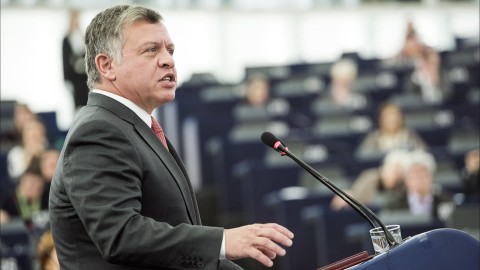King of Jordan wins Templeton Prize for fostering Muslim, interfaith cooperation
The Templeton foundation praised Abdullah II for building on "the power of principled pluralism."

King Abdullah II of Jordan has won the 2018 Templeton Prize for promoting dialogue and cooperation between Muslims of differing traditions.
The Templeton Prize is one of the largest individual prizes in the world, valued at 1.1 million British pounds, or about $1.4 million. The annual prize honors “a person who has made an exceptional contribution to affirming life’s spiritual dimension, whether through insight, discovery, or practical works,” the foundation said in a statement.
Abdullah, king of Jordan since 1999, “has led a reclamation of Islam’s moderate theological narrative from the distortions of radicalism,” the John Templeton Foundation said. His efforts have “come with great personal cost including condemnation and death threats from radical terrorist groups.”




